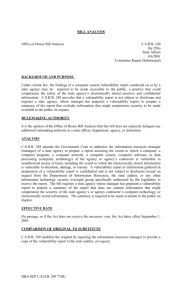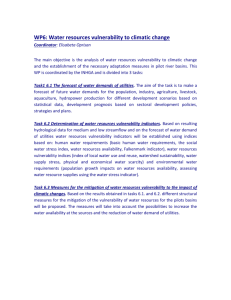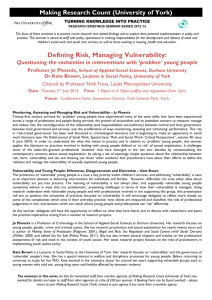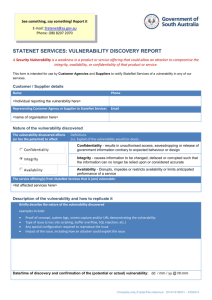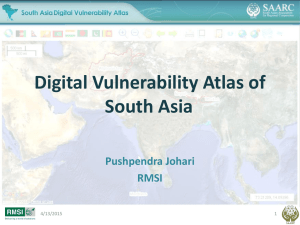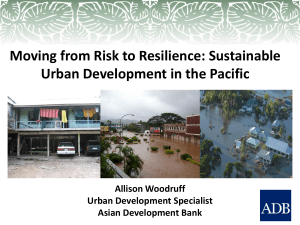Seminar Curriculum and Objectives - START
advertisement
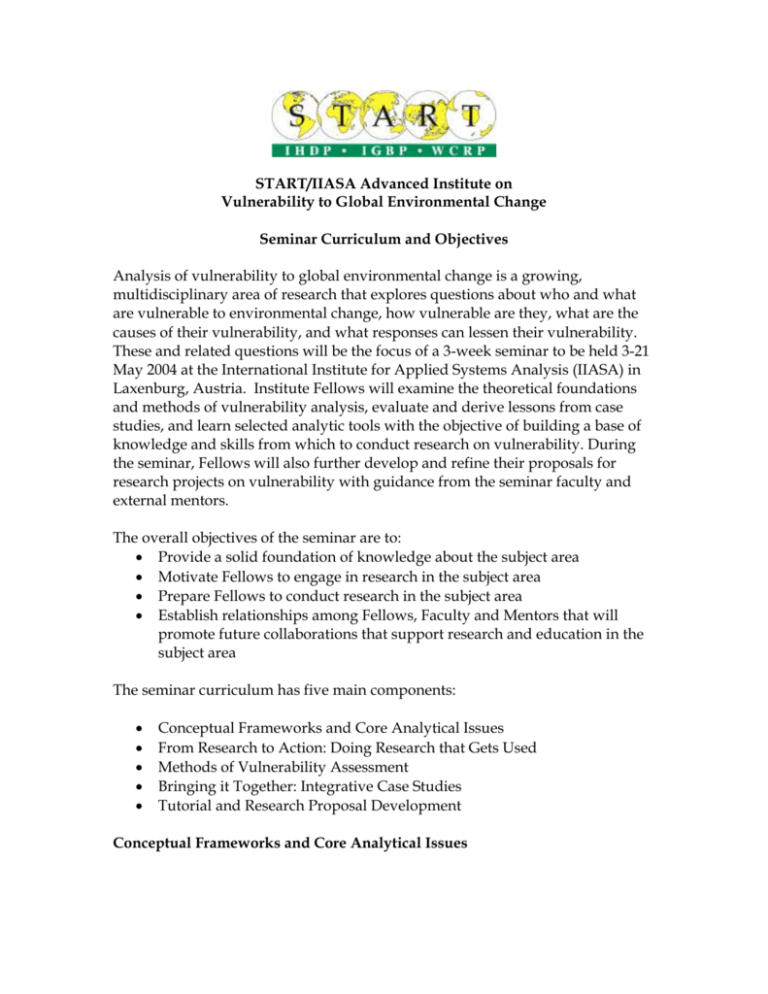
START/IIASA Advanced Institute on Vulnerability to Global Environmental Change Seminar Curriculum and Objectives Analysis of vulnerability to global environmental change is a growing, multidisciplinary area of research that explores questions about who and what are vulnerable to environmental change, how vulnerable are they, what are the causes of their vulnerability, and what responses can lessen their vulnerability. These and related questions will be the focus of a 3-week seminar to be held 3-21 May 2004 at the International Institute for Applied Systems Analysis (IIASA) in Laxenburg, Austria. Institute Fellows will examine the theoretical foundations and methods of vulnerability analysis, evaluate and derive lessons from case studies, and learn selected analytic tools with the objective of building a base of knowledge and skills from which to conduct research on vulnerability. During the seminar, Fellows will also further develop and refine their proposals for research projects on vulnerability with guidance from the seminar faculty and external mentors. The overall objectives of the seminar are to: Provide a solid foundation of knowledge about the subject area Motivate Fellows to engage in research in the subject area Prepare Fellows to conduct research in the subject area Establish relationships among Fellows, Faculty and Mentors that will promote future collaborations that support research and education in the subject area The seminar curriculum has five main components: Conceptual Frameworks and Core Analytical Issues From Research to Action: Doing Research that Gets Used Methods of Vulnerability Assessment Bringing it Together: Integrative Case Studies Tutorial and Research Proposal Development Conceptual Frameworks and Core Analytical Issues Objectives of the unit: to provide participants with an overview and understanding of (i) global change issues and drivers, (ii) the motivations and importance of vulnerability research, (iii) core concepts, and (iv) competing frameworks for vulnerability assessment. The broad issues of global change and vulnerability will be introduced in three “framing lectures” on socioeconomic processes, vulnerability of agriculture, and global scale changes in environment and human systems. The motivating questions of vulnerability research will be probed in detail by the institute Fellows through small group discussions. Conceptual frameworks and core analytic issues for vulnerability assessment will be examined in a series of five lectures on the coupled human-environment systems framework, vulnerability to extreme events, social vulnerability, resilience, and links between environmental change on the Millennium Development Goals. The unit will be covered during the first week of the seminar. From Research to Action: Doing Research that Gets Used Objectives of the unit: to get participants to think systematically about who might benefit from their research and explore research design and participatory research methods that can facilitate use of research in decision making. Examples of citizen-science projects that address information needs for decision making and stakeholders will be presented and discussed. Participatory methods that engage stakeholders in the selection of research objectives, research design, identification and integration of different sources of knowledge, evaluation of response options, and communication of knowledge will be emphasized. This unit will be the focus of the first day of week 2 of the seminar, but the issues will also be woven into and returned to in subsequent units of the seminar. Methods of Vulnerability Assessment Objectives of the unit: to provide participants understanding of the purposes and limitations of selected methods used in vulnerability assessments, develop familiarity with the methods through hands-on exercises, and build a knowledge base that will help participants to further explore and apply the methods in their research. The methods selected include scenario building, measures of vulnerability, spatial analysis of vulnerability and poverty, vulnerability profiles, risk analysis, and decision support system modeling. The material will be covered through a combination of lectures, hands-on exercises, and discussions during the second week of the seminar. Bringing it Together: Integrative Case Studies Objectives of the unit: to illustrate and critically examine vulnerability concepts and assessment approaches in the context of selected case studies. Case studies of vulnerability to environmental changes in Mexico, China and Africa will be explored and discussed in the third week of the seminar. The Mexican case study focuses on the Yaqui Valley of Sonora, Mexico, which includes a large irrigation district, a surrounding desert and coastal lands. The Yaqui River empties into the estuaries of the Gulf of California transferring effluents from agricultural run-off, urban centers, and pg farms. Valley stakeholder are concerned about sustaining yields in the face of globalized markets, reduced subsidies and price supports, drought, reductions in water quality and quantity, salinization. Vulnerability to these hazards appears to vary across stakeholders. The China case study is largely based on work carried out at IIASA, and looks in particular at food security, vulnerability to climate change, health and water. The African Case Study looks at the cross-scale institutional constraints that make it difficult to deal with vulnerability in Africa, as well as the need to integrate local knowledge into assessments. The case study focuses on the health sector and the impacts of climate change. Tutorial and Research Proposal Development Objectives of the unit: to achieve deeper understanding of the seminar material, improve Fellows’ research proposals, and encourage incorporation of lessons from the seminar into the research proposals. Each Fellow has been assigned a supervisor who will meet periodically throughout the seminar with the Fellow, both individually and in small groups. The supervisors will discuss material covered in the seminar with the Fellows and advise each Fellow on revising his/her research proposal. Each Fellow also has two mentors, one from his/her home institution and one assigned by the Advanced Institute on Vulnerability. Arrangements have been made for mentors to provide guidance before or during the seminar for improvement of research proposals. The mentors will also provide ongoing guidance during implementation of the research if the research is funded. Most of the assigned mentors will give lectures and participate in the seminar for one or two days each, providing an opportunity for Fellows and mentors to meet. Fellows will revise and give presentations of their proposals during the seminar. The supervisors will jointly review all proposals and make recommendations for approval of proposals shortly after the seminar.
